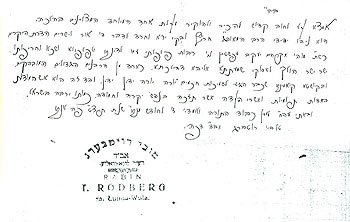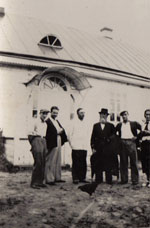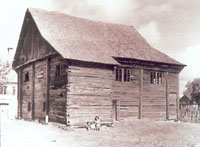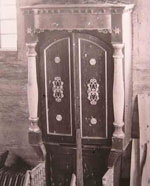| |
There were two synagogues in Lunna, both belonged to the "Mitnagdim" (opponents to the Chasidim);
the "old" synagogue and a Beth Midrash (house of learning) built sometime between the end of the 18th century
to the beginning of the 19th century, and the "new" synagogue, The
Stolin-Karlin Chasidim had a small wooden Shtibl (pray-house). There was a
Bathhouse and a Mikvah (ritual purification bath) in town. There was
one synagogue and a Beth Midrash in Wola. There were two churches in
Lunna; the Pravoslavic Church located in the middle of the central
square and the Catholic Church, built in 1782 close to the square
(renovated in 1895).
With respect to religious leaders of the community, Rabbi Tuvia
Rotberg (born ca. 1886) served as Lunna-Wola’s chief Rabbi from
1921 to the Holocaust. He was a disciple of Rabbi Israel Meir Ha'Cohen
known as the "Chafetz Chaim". Prior to his arrival to Lunna, Rabbi
Rotberg was the chief adjudicator of the Lipnishuk rabbinical court
and the Yeshivah leader in Eishyshok. Rabbi Rotberg had a close
relationship with Rabbi Shimon Shkopp who established the Yeshiva
"Shaar Torah" in Grodno. In 1929 both Rabbi Shkopp and Rabbi Rotberg
traveled to the United States and collected donations for the Yeshiva.
In 1933, after the death of the "Chafetz Chaim", Lunna-Wola’s Jews
purchased letters to support the writing of a Sefer Torah in his
memory. There is a list of
Lunna-Wola Jewish donors sent by Rabbi Rotberg to "Vaad
Ha'Yeshivot" (Council of the Yeshivas) in Vilnius on May 7, 1934
(Source: Archive at Yivo Institute for Jewish Research). In 1939,
Rabbi Tuvia Rotberg from Lunna and Rabbi Moshe Helshtein from Lenin
(now in Belarus) pronounced a verdict regarding a compromise between
two sides of directors of the Radin Yeshiva which had been headed by
the "Chafetz Chaim" before his death (in 1933).
A certificate of ordination to the Rabbinate was given by Rabbi Tuvia
Rotberg to Rabbi Abraham Yaakov Epstein, known as Rabbi Zeidel
Epstein, on the 4th day of month Av, 5699 (1939). Rabbi Epstein died
in Jerusalem on the first day of month Elul, 5767 (2007), at the age
of 100.
|
 |
|
|
Certificate of Ordination to the Rabbinate |
|
Rabbi Rotberg
was an honoree president of the "Gmilut Chesed" fund ("interest-free
loans") in Lunna. He was a Zionist and proud of his three sons who
immigrated to Eretz Israel between 1936 and 1938. Rabbi Rotberg and
his wife, Rasha Mina, intended to immigrate to Israel (they had
already certificates) before the Second World War, but chose to stay
with the community in Lunna. Rabbi Rotberg’s wife, Rasha Mina, was
killed on Saturday, June 22, 1941, in a German air raid. Rabbi Rotberg
was murdered on December 8, 1942, in the Auschwitz Death Camp.

|

|

|
|
Rabbi Tuvia Rotberg
(in the middle, holding an umbrella) in front of the "old" synagogue (1930s)
From the collection of Saul Rotberg |
The old Chassidic synagogue of Lunna (ca. 1930)
(From the collection of Tomek Wisniewski) |
Aron Ha'Kodesh (Holy Ark) in
the "old" synagogue (1930)
(From the collection of Tomek Wisniewski) |
This site is hosted at no cost by JewishGen, Inc., the Home of Jewish
Genealogy. If you have been aided in your research by this site and
wish to further our mission of preserving our history for future
generations, your
JewishGen-erosity is greatly appreciated.
|
Compiled by
Ruth Marcus & Aliza Yonovsky Created
May 2007
Updated by rLb, March 2020
Copyright © 2007 Ruth Marcus
All the photos are presented
by courtesy of the families and are not allowed to be reproduced
without their permission. |
|
|